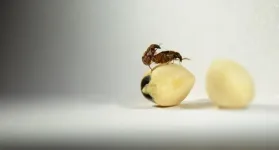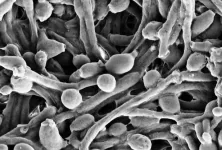(Press-News.org) ALBUQUERQUE, N.M. -- For decades, scientists have tried to make reliable lithium-metal batteries. These high-performance storage cells hold 50% more energy than their prolific, lithium-ion cousins, but higher failure rates and safety problems like fires and explosions have crippled commercialization efforts. Researchers have hypothesized why the devices fail, but direct evidence has been sparse.
Now, the first nanoscale images ever taken inside intact, lithium-metal coin batteries (also called button cells or watch batteries) challenge prevailing theories and could help make future high-performance batteries, such as for electric vehicles, safer, more powerful and longer lasting.
"We're learning that we should be using separator materials tuned for lithium metal," said battery scientist Katie Harrison, who leads Sandia National Laboratories' team for improving the performance of lithium-metal batteries.
Sandia scientists, in collaboration with Thermo Fisher Scientific Inc., the University of Oregon and Lawrence Berkeley National Laboratory, published the images recently in END
The hidden culprit killing lithium-metal batteries from the inside
First-of-their-kind snapshots reveal byproduct crippling powerful, experimental cells
2021-07-14
ELSE PRESS RELEASES FROM THIS DATE:
Melanoma of the eye: Preclinical tests show path toward treatment
2021-07-14
BIRMINGHAM, Ala. - Uveal melanoma, or UM, is a rare and deadly cancer of the eye, and the mortality rate has remained unimproved for 40 years. Half of the melanomas spread to other organs of the body, causing death in less than a year, so new treatments to preserve vision and prevent death are an urgent need.
Now a preclinical study by researchers at the University of Alabama at Birmingham and Emory University, Atlanta, offers hope -- a small molecule inhibitor has been identified that dampens the potent drivers of this tumor. In mouse models, the inhibitor, KCN1, strongly limited primary disease in the eye and metastatic tumor dissemination ...
Male beetles' spiny genitalia both harmful and beneficial to females
2021-07-14
Male seed beetles with genital structures that injure females may have greater reproductive success. As new research from Uppsala University shows, females that mate with such males benefit, in the sense that their offspring are healthier. This new piece of the puzzle will help scientists to understand how complex mating interactions between males and females have developedevolved. The study is published in Proceedings of the Royal Society B.
"This helps us understand is connected with the evolutionary dance between males and females of all animal species, ...
Scientists identify new gut-liver drug recycling process
2021-07-14
A team of University of Houston pharmaceutical researchers is reporting a newly recognized process of drug metabolism in the intestines - followed by recycling through the liver - that could have important implications for developing treatments for intestinal diseases and for taking multiple medications at the same time.
"The intestines play a crucial role in metabolizing and recycling certain plant compounds and drugs," reports Ming Hu, Diana S-L. Chow Endowed Professor of Drug Discovery and Development and the senior author of the paper in eLife. "The discovery has important implications for scientists trying to understand how ...
USGS-led study helps in the fight against the coronavirus pandemic
2021-07-14
A new study led by the U.S. Geological Survey outlines a means to better estimate COVID-19 occurrence and trends in populations.
Currently, COVID-19 testing is primarily limited to self-selected individuals, many of whom are symptomatic or have had contact with someone who is symptomatic. While these tests are useful for individual medical treatment and contact tracing, they do not provide health officials with a complete picture of the disease across the population.
"Coordinated sampling of COVID-19 is key to informing health officials as they continue their efforts to control the pandemic, permitting better predictions of disease dynamics and ...
Antibiotics in early life could affect brain development
2021-07-14
Antibiotic exposure early in life could alter human brain development in areas responsible for cognitive and emotional functions, according to a Rutgers researcher.
The laboratory study, published in the journal iScience, suggests that penicillin changes the microbiome - the trillions of beneficial microorganisms that live in and on our bodies - as well as gene expression, which allows cells to respond to its changing environment, in key areas of the developing brain. The findings suggest reducing widespread antibiotic use or using alternatives when possible to prevent neurodevelopment problems.
Penicillin and related medicines (like ampicillin and amoxicillin) are the most widely used antibiotics in ...
Hydrogel composite developed to help protective gear rapidly degrade toxic nerve agents
2021-07-14
Scientists at Northwestern University in Evanston, Illinois have developed a hydrogel integrated with zirconium-based robust metal-organic frameworks (MOFs) that rapidly degrades organophosphate-based nerve agents used in chemical warfare. Unlike existing powdered MOF adsorbents, this hydrogel composite does not require added water and may be easily scaled up for use in protective masks or clothing. The work appears July 14 in the journal Chem Catalysis.
"Organophosphate-based nerve agents are among the most toxic chemicals known to humanity," says senior author Omar Farha, a professor of chemistry at Northwestern University. "Their use in recent global conflicts reflects the urgent need for personal protective gear, as well as the bulk destruction of ...
Fungi that live in the gut influence health and disease
2021-07-14
(Salt Lake City) - Bacteria's role in gut health has received a lot of attention in recent years. But new research led by scientists at END ...
Researchers identify signaling molecule that may help prevent Alzheimer's disease
2021-07-14
BOSTON - New research in humans and mice identifies a particular signaling molecule that can help modify inflammation and the immune system to protect against Alzheimer's disease. The work, which was led by investigators at Massachusetts General Hospital (MGH), is published in Nature.
Cognitive decline associated with Alzheimer's disease develops when neurons begin to die. "Neuron death can be caused by improper immune responses and excessive neuroinflammation--or inflammation in the brain--triggered by high levels of amyloid beta deposits and tau tangles, two hallmarks of Alzheimer's disease," explains the paper's co-senior author Filip Swirski, PhD, who conducted the work while a principal investigator in the Center for Systems Biology at MGH. ...
Researchers discover how hunger boosts learning about food in mice
2021-07-14
BOSTON - Over the last decade, investigators at Beth Israel Deaconess Medical Center (BIDMC) have been at the forefront of the effort to END ...
Newfound human brain cell type helps center people in mental maps
2021-07-14
New York, NY--July 14, 2021-- A previously unknown kind of human brain cell appears to help people center themselves in their personal maps of the world, according to a new study from neuroscientists at Columbia Engineering. This discovery sheds light on the cellular mechanisms underlying navigation and memory in humans, as well as what parts of the brain might get disrupted during the kinds of memory impairments common in neurodegenerative diseases such as Alzheimer's.
There are two strategies with which humans and animals navigate and orient themselves. One involves locating places, distances and directions in "allocentric" or other-centered ...
LAST 30 PRESS RELEASES:
Scientists identify smooth regional trends in fruit fly survival strategies
Antipathy toward snakes? Your parents likely talked you into that at an early age
Sylvester Cancer Tip Sheet for Feb. 2026
Online exposure to medical misinformation concentrated among older adults
Telehealth improves access to genetic services for adult survivors of childhood cancers
Outdated mortality benchmarks risk missing early signs of famine and delay recognizing mass starvation
Newly discovered bacterium converts carbon dioxide into chemicals using electricity
Flipping and reversing mini-proteins could improve disease treatment
Scientists reveal major hidden source of atmospheric nitrogen pollution in fragile lake basin
Biochar emerges as a powerful tool for soil carbon neutrality and climate mitigation
Tiny cell messengers show big promise for safer protein and gene delivery
AMS releases statement regarding the decision to rescind EPA’s 2009 Endangerment Finding
Parents’ alcohol and drug use influences their children’s consumption, research shows
Modular assembly of chiral nitrogen-bridged rings achieved by palladium-catalyzed diastereoselective and enantioselective cascade cyclization reactions
Promoting civic engagement
AMS Science Preview: Hurricane slowdown, school snow days
Deforestation in the Amazon raises the surface temperature by 3 °C during the dry season
Model more accurately maps the impact of frost on corn crops
How did humans develop sharp vision? Lab-grown retinas show likely answer
Sour grapes? Taste, experience of sour foods depends on individual consumer
At AAAS, professor Krystal Tsosie argues the future of science must be Indigenous-led
From the lab to the living room: Decoding Parkinson’s patients movements in the real world
Research advances in porous materials, as highlighted in the 2025 Nobel Prize in Chemistry
Sally C. Morton, executive vice president of ASU Knowledge Enterprise, presents a bold and practical framework for moving research from discovery to real-world impact
Biochemical parameters in patients with diabetic nephropathy versus individuals with diabetes alone, non-diabetic nephropathy, and healthy controls
Muscular strength and mortality in women ages 63 to 99
Adolescent and young adult requests for medication abortion through online telemedicine
Researchers want a better whiff of plant-based proteins
Pioneering a new generation of lithium battery cathode materials
A Pitt-Johnstown professor found syntax in the warbling duets of wild parrots
[Press-News.org] The hidden culprit killing lithium-metal batteries from the insideFirst-of-their-kind snapshots reveal byproduct crippling powerful, experimental cells





